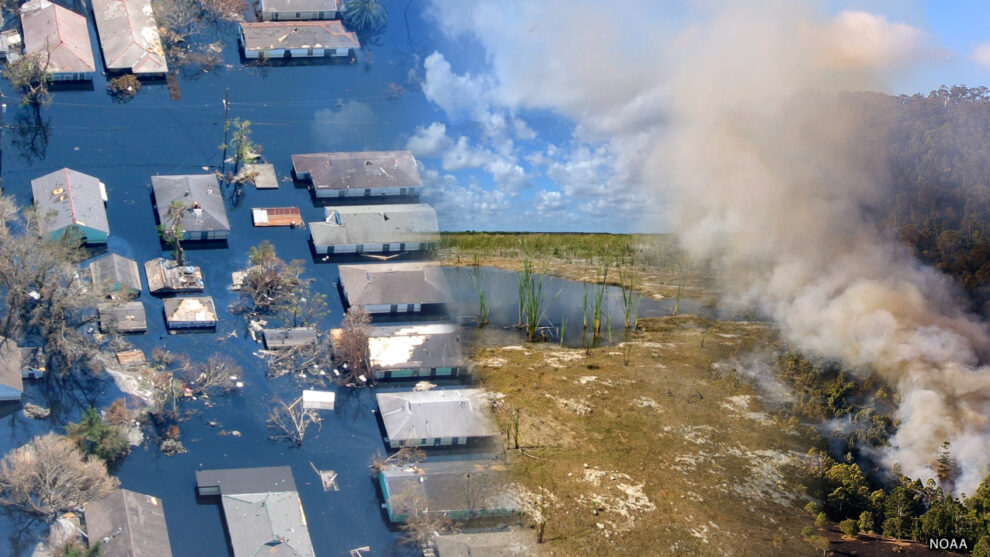Today, the Department of Commerce and NOAA announced that $3.9 million in funding from the Bipartisan Infrastructure Law will be awarded over four years to existing NOAA Climate Adaptation Partnerships (CAP) / Regional Integrated Sciences and Assessments (RISA) teams and expansion activity regions. The funding will be used to test, scale up and transfer knowledge to build national adaptation to floods and wildfires.
According to the latest figures from NOAA’s National Centers for Environmental Information, the U.S. has sustained 371 separate billion-dollar weather and climate disasters since 1980, including 42 flooding events and 22 wildfires. These new funds will enable NOAA to help communities build adaptive capacity to coastal and inland flooding and wildfire risk across many U.S. regions, including the continental U.S., Hawaii, Puerto Rico and the U.S. Virgin Islands.
“Communities across the country are working to build resilience against climate change and unlock climate-smart economic growth,“ said U.S. Secretary of Commerce Gina Raimondo. “This investment, part of President Biden’s Investing in America agenda, will strengthen connections among municipal planners, resource managers, business and policy leaders seeking to use the best available science and local expertise to address climate-related risks.”
The awarded projects are:
- Improving engagement methods for coastal resilience planning: The funded projects will evaluate and improve engagement methods with coastal communities that help them plan for flooding and inundation to support comprehensive planning activities for coastal climate resilience and implementable climate adaptation solutions to flooding and inundation.
- Stories as science: Integrating lived experience and community knowledge into actionable adaptation science in Pacific Northwestoffsite link and Pacific Islandsoffsite link regions. ($499,183 to University of Washington, Arizona State University).
- Improving engagement methods with communities for coastal resilience and reducing climate risk: Bridging learning networks in the Urban Northeastoffsite link and U.S. Caribbean regions ($499,836 to Worcester Polytechnic Institute, Drexel University, University of the Virgin Islands, Foundation for Puerto Rico).
- Assessing tradeoffs and co-benefits for complex decision-making in communities facing coastal inundation and/or inland flooding: The funded projects will develop new or improved approaches for identifying and assessing tradeoffs and co-benefits of flood mitigation infrastructure options in communities affected by coastal inundation and/or inland flooding.
- Enabling equitable adaptation to changing coastal flood risks through community-engaged modeling in the Carolinasoffsite link and Pacific Islandsoffsite link regions ($486,933 to University of North Carolina at Chapel Hill, North Carolina State University, The Museum of Life and Science, University of Hawaii).
- Co-developing a decision-support framework for adaptation to coastal flooding: A comparative case study of communities in the Urban Northeastoffsite link and Mid-Atlanticoffsite link regions ($486,990 to Columbia University, Stevens Institute of Technology, Virginia Institute for Marine Science, Shinnecock Nation).
- Incorporating principles of environmental justice into forecast-informed water reservoir operations: A climate and flood adaptation strategy in the Westoffsite link and Southeast regions ($474,343 to University of California San Diego, University of Georgia).
- Coast to coast: Using scenario planning to build resilience to compound flooding in the Great Lakesoffsite link and Southeast regions ($474,554 to University of Michigan, University of Georgia).
- Identifying complex interactions between social infrastructure and wildfire risks to improve community adaptive capacity: The funded projects will advance actionable knowledge of the interactions between wildfire risk and social infrastructures in order to develop relevant solutions to improve climate resilience and reduce wildfire risk in frontline communities.
- Understanding the role of social infrastructure in extreme heat and wildfire smoke vulnerability mitigation: A regional comparison in the West and Pacific Northwest regions ($474,859 to Desert Research Institute, University of Washington).
- Health and social services in the long-term wildfire recovery of rural communities in the Southwest and Intermountain West regions ($473,798 to University of Arizona, University of Colorado Boulder).
Source: NOA















